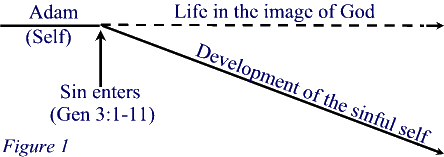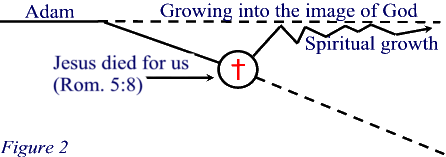
Optional Starting Point- THE BIBLE, GOD, and PEOPLE
- The Bible - our authority
for faith, doctrine, and conduct.
- 1.1 The origin of the Bible (2 Tim 3:16; 2 Pet. 1:21)
- The Bible teaches that God
is:
- 2.1 The Creator (Gen. 1:1; Acts 17:24-31)
- 2.3 The Alpha and the Omega (Rev 1:8; 21:6; 22:13)
- 2.5 The God of eternal love (Jeremiah 31:3)
- 2.7 A Spirit (Jn. 4:24; 2 Cor. 3:17)
- 2.8 A Trinity (Genesis
1:26,27; Matt. 28:19; Jn. 8:58; 1 Pet.1:2; 2 Pet.1:1; Acts 5:3-5;
2 Cor.3:17 and 13:14)
- 2.9 Just (Deut. 32:4)
- The Bible teaches that I
am:
- 3.1 A unique creation of God (Psalm 139:13-16)
- 3.3 Separated from God (Isaiah 59:2)
- God's original plan for
humankind. (Figure #1)
- 4.1 What did God have in mind when he created humans? (Genesis 1:26,27)

- How God brings hope to people
- His plan still intact.
(Figure #2)
- 5.1 If God has not changed His plan for people, even after the fall, what change needs to
- take place so that humankind can participate in that plan (John 1:12,13; Col. 2:13; Col. 3:9,10)? There has to be a change within people themselves. [This is a change from being lost to becoming a follower of Christ.]
- 5.2 How people may become
alive in Christ: (Rev. 3:20; Jn. 1:12; & Rom. 10:9)
- God's plan for followers
of Jesus Christ.
- 6.1 It always has been and will be God's plan that we be conformed to the image of Jesus,
- His Son.(Rom. 8:29; Gal. 4:19; James 1:18; I Jn. 3:2)
- 6.2 How we may participate
in this process.
- Every person bears the image of our father, Adam, but is able to receive the image of the "man from heaven" which is God's plan. (1 Cor.15:49)
- This is an ongoing transformation if we keep our focus on Christ. (2 Cor. 3:18; Rom. 8:29)
- What will we finally
be like in the future? (I Jn. 3:2)
- Two ways in which salvation
may be understood.
- 7.1 One very common but un-biblical way is to see our salvation as simply an escape from
- an unpleasant end (hell).
- But then where is the motivation to become what God has planned for us or the desire to seek after maturity?
- Does God exist just for people's good or do people exist for God? (Col. 1:15,16; Eph.1:5-6,12)
- 7.2 The biblical understanding of salvation is seen in our relationship with Christ - there is
- an interchange of life (Gal.2:20)
which:
- -Produces in the Christian the desire to reflect the image of God (Rom. 8:8,9; Phil. 2:13-15; 2 Cor. 5:17).
- - Produces the desire to grow & mature (Rom. 8:9-14; Gal.4:19).
- Helps the Christian handle the difficulties of life (Phil. 4:12-13).
- Thrusts us out to do
good works (Eph. 2:10; Titus 3:8).
- Understanding Christian
maturity.
- 8.1 What did Paul have in mind when he discipled Timothy? (2 Tim 2:2)
- 8.3 How are we benefited from discipleship? (Rom. 1:11,12)
- 8.5 Some goals for the
Christian:
- Become like Christ Himself (Rom.8:29, 2Cor 3:18)
- Be faithful (1 Cor. 4:2)
- 8.6 Who is our model? (Eph.4:13)


Homework: Memorize
Rom. 8:29 ![]()
Discipleship
Home
|Jump-Start
|
The 10 Steps | Ordering Material|
About the Authors|
Other Resources
All
materials Copyright ©2003 by Jerold & Nancy Reed.
All material in these Discipleship Encounters may be copied and passed
on to others.